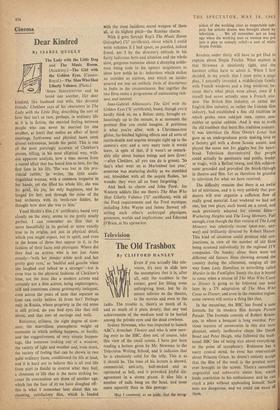Cinema
Dear Kindred
By ISABEL QUIGLY
The Lady with the Little Dog and The Music Room.
(Academy.)—The Girl with
the Golden Eyes. (Cameo- Royal.)—The Man Who Shot Liberty Valance. (Plaza.) `ANNA SEItGLJEYEVNA and he loved one another, like dear kindred, like husband and wife, like devoted friends,' Chekhov says of his characters in The Lady with the Little Dog, describing the sort of love that isn't so rare, perhaps, in ordinary life as it is in fiction, the married feeling between people who can never be married (to one another, at least) that makes an affair of hotel meetings, furtiveness and physical haste seem almost extraneous, beside the point. This is one of the most piercingly accurate of Chekhov's stories, telling, in his most elliptical way,. with- out apparent analysis, how a man moves from a casual affair that has bored him to love, for the first time in his life. 'She was lost in this pro- vincial rabble,' he writes, 'the little undis- tinguished woman, with a common lorgnette in her hands, yet she filled his whole life; she was his grief, his joy, his only happiness, and he longed for her; and through the noise of the bad orchestra with its tenth-rate fiddles, he thought how dear she was to him.'
Yosef Heifitz's film (`A' certificate), based very closely on the story, seems to me pretty nearly perfect. I can remember no film that is more beautifully in its period or more exactly true to its origins, not just in physical detail, which you might expect, but in spirit, and even in the bones of those that appear in it, in the fashion of their faces and physiques. Where did they find an actress who is not just Anna exactly—`with her slender white neck and her pretty grey eyes,' so 'bashful and gauche when she laughed and talked to a stranger'—but is even true to the physical fashions of Chekhov's time, not the least like a modern actress and certainly not a film actress, being unphotogenic, stiff and sometimes almost grotesquely inelegant, even across the years of taste that separate us (one can really believe it) from her? Perhaps only in Russia, where propriety in the old sense is still prized, do you find eyes like that still about, and that sort of carriage and walk.
Reticence, stillness, the right degree of slow- ness; the marvellous atmospheric weight of moments in which nothing happens, or hardly, and the suggestiveness of very simple happen- ings, like someone looking out of a window; the variety of light and weather and, even more, the variety of feeling that can be shown in two quite ordinary faces, conditioned (in life at least, and it is hard not to believe this is all real life from start to finish) to control what they feel; a closeness to life that is the more striking be- cause its conventions are those of another age, which (on the face of it) we have sloughed off: this is what I remember best about this en- chanting, satisfactory film, which is loaded
with the most insidious secret weapon of them all, at its highest pitch—the Russian charm.
With it goes Satyajit Ray's The Music Room (Ialsaghar) (`U' certificate), about which I could write volumes if I had space, so puzzled, indeed foxed, am I by the director's attitude to his fairly ludicrous hero and situation and the whole slow, gorgeous nonsense about a decaying noble- man being rude to- his upstart neighbours to show how noble he is: behaviour which strikes an outsider as curious, and which an insider assured me was an unlikely form of discourtesy in India in the circumstances. But together the two films make a programme of outstanding rich- ness and interest.
Jean-Gabriel Albicocco's The Girl with the Golden Eyes ('X' certificate), based, though you'd hardly think so, on a Balzac story, brought ex- haustingly up to the minute, is at moments the prettiest film you could imagine, if prettiness is what you're after, with a Christmas-tree glitter, far-fetched lighting effects and all sorts of razzle-dazzle and sequins brought right up to the camera's eye; and a very nasty taste it would leave, in spite of that, if it wasn't so remark- ably silly about human beings and love (love! —after Chekhov, all you can do is groan). `So that's what went on at Marienbad last year,' someone was muttering darkly as we stumbled out, bloodshot with all the sequin flashes, 'no wonder they were all so busy forgetting.'
And back to charm and John Ford: for \,% estern addicts like me there's The Man Who Shot Liberty Valance (`U' certificate), with all the Ford requirements and the Ford mystique, including John Wayne and James Stewart off- setting each other's archetypal physiques, presences, worlds and implications; and Edmond O'Brien, at his uproariest.


































 Previous page
Previous page